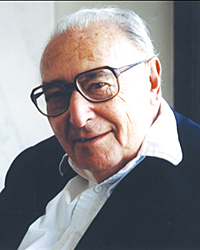
|
OBITUARIESLeonard Koppett ’44: Hall of Fame Sports Writer
Leonard Koppett ’44, a Hall of Fame baseball and basketball writer whose career spanned nearly six decades in New York and the San Francisco Bay area, died on June 22 of an apparent heart attack. He was 79. Koppett was born in the Soviet Union and moved
with his family to New York — one block from
Yankee Stadium — when he was 5. As an undergraduate,
Koppett worked in the Sports Information Office,
most of the time under Irving T. Marsh, a New
York Herald Tribune sports writer who moonlighted
at Columbia as a war-time fill-in. Koppett compiled
the first detailed statistical records of the University’s
athletic teams, and he served as an unofficial adviser
to the sports information office for more than four
decades after his graduation. Koppett was a fixture in the press box at San Francisco Giants and Oakland A’s games, challenging writers and team employees to think about the game from oblique perspectives. He was one of the first writers to use statistics not readily found in box scores, incorporating them with nearly 60 years’ worth of observations to reach his conclusions. “He would compare how many home runs were hit in the 1930s with the kind of ball they used and how they changed the height of the mound in the ’40s and ’50s. He really broke it apart and was great at comparing the eras,” said Marty Lurie, who often invited Koppett to appear on his radio program, Right off the Bat, on the Oakland A’s flagship station. Koppett covered the great home-run race between Roger Maris and Mickey Mantle in 1961, when Maris hit 61 home runs to break Babe Ruth’s long-standing record of 60. His recollections were sought frequently when Mark McGwire and Sammy Sosa raced to break Maris’s home-run record in 1998, and later when Barry Bonds extended the record. Koppett was elected into the writers’ wing of the Baseball Hall of Fame in 1992. “He was one of the most innovative, knowledgeable and astute thinkers in the game of baseball,” said Ross Newhan, the Hall of Fame baseball writer for the Los Angeles Times. “I think with all of the years he spent writing about the game, he brought a fresh perspective to complex subjects.” Koppett also covered the National Basketball Association in its formative years and was recognized with the Curt Gowdy Media Award, the Basketball Hall of Fame’s highest honor for members of the media, in 1994. After he left the Times Tribune in 1993, Koppett continued to write provocative columns about baseball and other sports for the New York Times, Oakland Tribune, San Francisco Chronicle and many other newspapers around the country, working from his Palo Alto home. His last Chronicle column was about Bonds’ legacy, published on April 14. He also wrote a weekly column for The Seattle Post-Intelligencer at the time of his death. Koppett wrote 15 books, including The Thinking
Fan’s Guide to Baseball (Total Sports,
2001, third edition), 24 Seconds to Shoot: The
Birth and Improbable Rise of the National Basketball
Association (Total/Sports Illustrated, 1999,
revised) and Koppett’s Concise History
of Major League Baseball (Temple University
Press, 1998). Koppett’s son, David, said of his father: “He had an amazing interest in many things. That’s what made him so unusual as a sports writer. He had interest in astronomy, history, literature … all those things.” Koppett also enjoyed music and theater. His son recalled how his father and the A’s announcer, Bill King, sometimes sat in a car listening to broadcasts of the Metropolitan Opera from New York while waiting to go into the stadium for a ballgame. In addition to his son, Koppett is survived by his wife of 39 years, Suzanne; daughter, Katherine; and one grandchild. Gifts in Koppett’s honor may be sent to the Rabbi Janet Marder Charitable Foundation and/or Columbia College. Gifts to the College should be made payable to Columbia College Fund and mailed to the attention of Derek Wittner ’65, associate dean of alumni affairs and development, at the Alumni Office. L.P.
|
|
|||||||||||||||||||||||||||||||||||||||||||||||||||||||||
